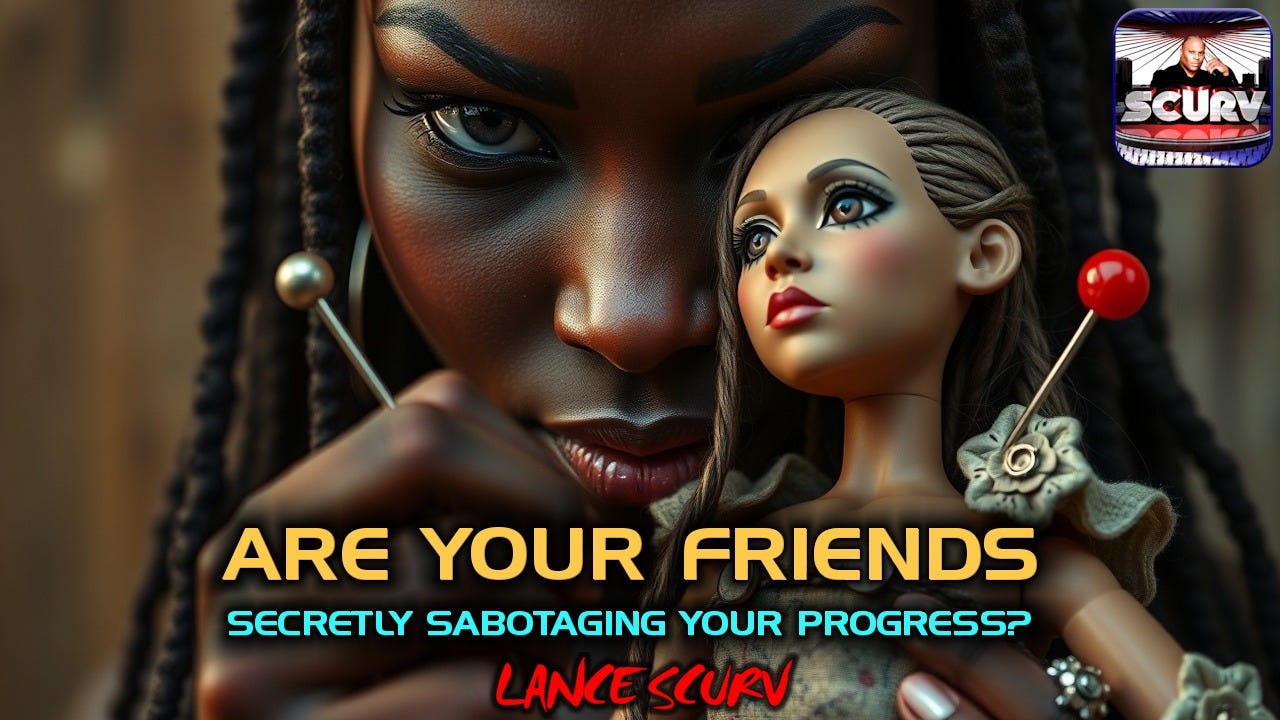WHEN FRIENDS SECRETLY RESENT YOU...
HIDDEN SABOTAGE IN THE AGE OF REINVENTION
Retirement is often seen as a time of peace, reflection, and fulfillment—a chance to dive into the passions we once shelved during the hustle of everyday life. For some of us, that means creating, writing, speaking, or building platforms that share our voice with the world. Yet, what’s rarely spoken about is the emotional turbulence that can arise—not from strangers or critics, but from the very people we’ve called friends for decades.
There’s a certain discomfort that surfaces when old friends see you thriving in areas they’ve either neglected or failed to develop. It’s not that they will come out and say they’re jealous. No, it’s more covert than that. They might flood you with random messages throughout the day, derailing your creative flow. Or they may “support” you with silence—never liking, sharing, or even mentioning your work. These micro-behaviors become roadblocks, not just of productivity, but of peace.
In truth, many of us carry unresolved dynamics from childhood and young adulthood into our elder years. That kid who always wanted to be the center of attention, the one who felt overshadowed, or the one who lived in someone else’s shadow—those feelings don’t magically disappear. They ferment. And when you shine later in life, when you're consistent, disciplined, and goal-oriented—they simmer into resentment.
It’s especially painful because these aren't random internet trolls. These are people who know you—your past, your growth, your struggles. They said they believed in you. But now, your success feels like a mirror reminding them of their own lack of motion. And so, instead of cheering you on, they throw mental and emotional speed bumps your way, dressed up as casual interactions.
The biggest insult isn’t in their silence or sabotage—it’s in the gaslighting. They’ll deny it. They’ll say you're overthinking. But your spirit knows when the energy shifts.
You feel it in your chest, in the delay of their response, in the way they never recommend your work to others. And that’s what this article is about—naming that unspoken energy and protecting your mind from those subtle assassins of purpose.
Let’s start with the social media sabotage. Something that I know about all to well in my two decades-plus years of dealing with these occultic online “entities”. You sit down to create—focused, inspired, ready to produce. Suddenly, here comes a link dump from a friend who rarely checks in. It’s not about your work. It’s not connected to your vision. It’s noise. They might claim they thought of you or figured you’d enjoy it, but timing is everything. These distractions aren't neutral—they’re strategic. It’s like they're trying to hijack your mental bandwidth, even if they don’t consciously realize why they’re doing it.
Then there’s the issue of validation—or lack thereof. Some of these individuals will never tell you that you’re doing well, even if they watch every single piece of content you produce. They’ll never repost your work or recommend you to others.
Why?
Because your light forces them to confront their own dimness. And in their eyes, the only way to level the playing field is to ignore your shine. That silence isn’t forgetfulness—it’s calculated restraint.
Another sign of hidden resentment is the way they overcompensate with flattery for others, but never for you. They’ll brag about a celebrity or a stranger’s accomplishments but struggle to say one kind word about your consistency, your skill, or your evolution. It’s not just envy—it’s a refusal to acknowledge that someone from their own circle actually made something of themselves. That makes it too real.
And finally, there’s the sabotage of your time. Invitations that seem harmless but are always at your most productive hours. Emotional unloads that drain your spirit. Gossip sessions that steal your focus. It’s not that they want to connect—it’s that they want you to be as unproductive and scattered as they are. Misery doesn’t just love company. It requires it to feel justified in its stagnation.
So how do you navigate this terrain when the saboteurs wear the face of old friends?
First, you must acknowledge it without guilt. It doesn’t make you a bad person to admit that someone’s energy no longer supports your growth. Protecting your peace isn’t betrayal—it’s survival. Especially in this season of purpose, when time is more precious than ever.
Second, reduce access. You don’t owe everyone a front-row seat to your process. Set boundaries around your time, your creative windows, and your emotional energy. Let people learn how to interact with you anew. Those who love you will adjust. Those who don’t were never really rooting for you anyway.
Third, let your work speak. Don’t explain your ambition to those committed to misunderstanding it. Keep creating. Keep building. Keep showing up. The ones who matter will notice. The ones who don’t were just spectators waiting for you to fall.
Fourth, surround yourself with new energy. Retirement doesn’t mean isolation. It means rebirth. Find other creators, visionaries, and builders who are just as hungry for growth as you are. Engage in spaces where your light is welcomed, not dimmed.
Lastly, forgive—but don’t forget. Carry no hate, but keep your discernment sharp. Some friendships are seasonal. Others are situational. And a few are simply relics of a time that no longer serves you. Love from a distance if you must—but never let their hidden resentment become your burden.




